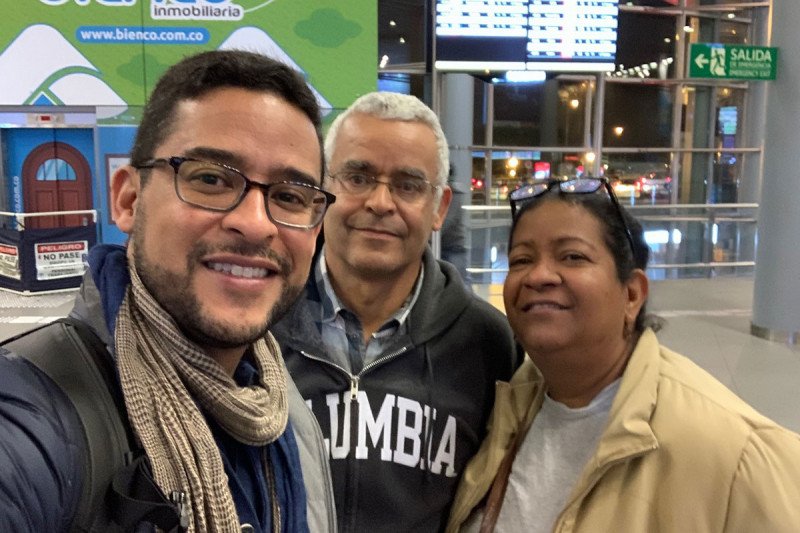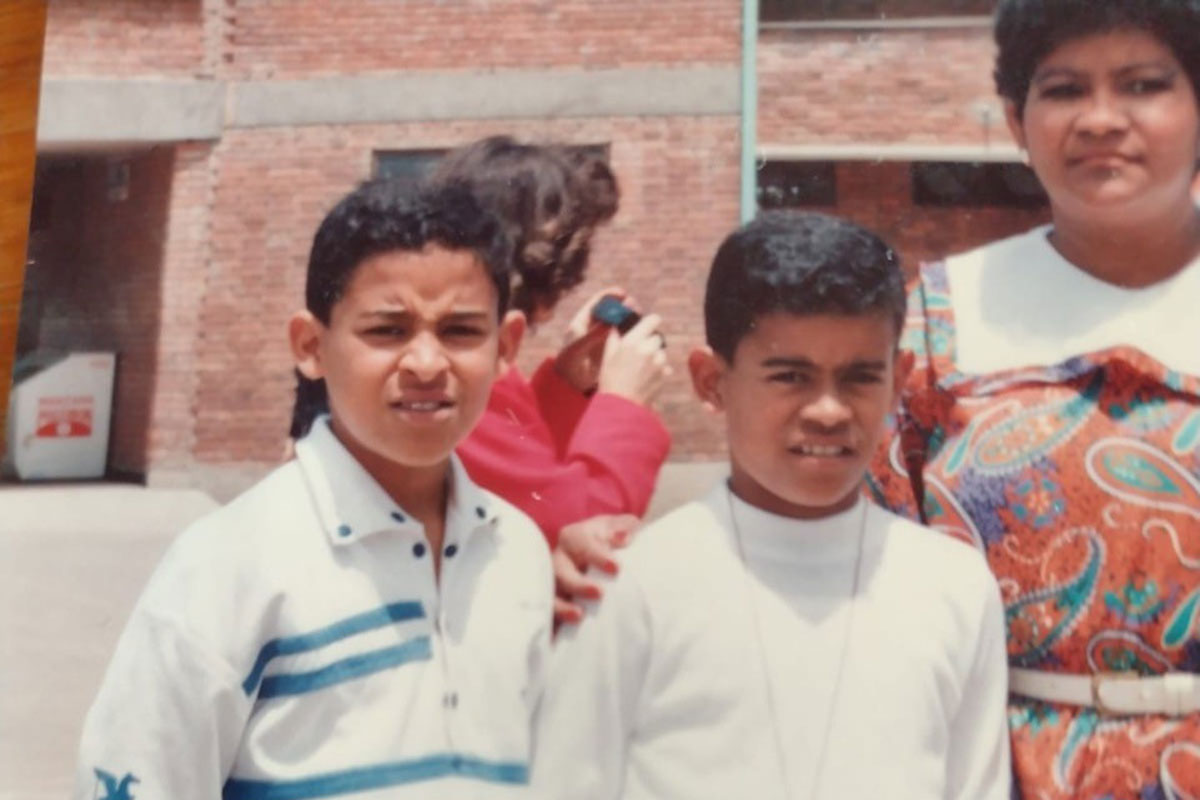
Dr. Figueroa Ortiz (left) with his parents. His mother was a biology teacher and later a principal, while Cesar’s father worked in computer science and had his own business.
For Cesar Figueroa Ortiz, New York City is his long-awaited home. As a native of Bogotá, Colombia, he remembers stepping out of a subway station into Times Square several years ago and finding himself surrounded by throngs of people speaking multiple languages. “I had never experienced so much diversity,” he recalls. “I had always wanted to live in a city with people from all over the world and knew then that I had found my place. I immediately felt that I was home.”
Dr. Figueroa Ortiz joined Memorial Sloan Kettering Cancer Center 10 years ago as a fellow in the Infectious Diseases (ID) Service, where he remains today as an infectious disease specialist. He cares for patients suffering from infection, whether it’s the result of their cancer, their cancer treatment, or something else. “In ID, we don’t have an organ that we specialize in because any organ can suffer from infection,” he says. “The pathologies we treat are extremely varied, which makes it a particularly interesting, exciting field.”

Cesar Figueroa Ortiz
He and other ID physicians often see patients whose cancer has been cured, but who continue to struggle with infections — and only want to receive care at MSK. “MSK treats patients in such a humane, compassionate way — it’s hard to imagine the same degree of empathy exists everywhere,” says Dr. Figueroa Ortiz. “That’s why patients don’t want to go anywhere else, even after they beat cancer.”
Dr. Figueroa Ortiz and the ID team are also called in, along with their colleagues on the Infection Control team, when there is a cluster of infections at MSK.
“Most of the work during outbreaks is done by Infection Control,” Dr. Figueroa Ortiz says. “Infection Control will do contact tracing and testing, isolate patients as necessary, coordinate with nurses, and so on. But then those of us in ID are responsible for coming up with treatment plans for the affected patients.”
Sometimes, ID staff are the first ones to spot a concerning cluster. “We will alert Infection Control that something may be happening,” Dr. Figueroa Ortiz says. “For instance, I may see three patients with the same unusual infection and will reach out to Infection Control to let them know that something might be brewing.”
Determined and Disciplined
Dr. Figueroa Ortiz grew up in Bogotá with his parents and two younger brothers, living a secure middle-class life. “We didn’t have a lot, but we had enough that my parents were able to give all of us a good education,” he says. He made the most of it.
“I liked to study — I was very focused on academics; my parents never had to twist my arm to do my schoolwork,” he explains. Besides academics, his other passion was gymnastics. He attended school from to , had lunch at home, then trained in the gym from 2:00 to Back at home, when he wasn’t doing homework or sleeping, he was responsible for his brothers, as their parents worked long hours outside of the house.
It was a demanding schedule, requiring great discipline and self-motivation, which made it perfect preparation for a career as a doctor — something he knew from an early age that he wanted to pursue.
“I was always attracted to human biology and science,” he says. “When I thought about a career, I was drawn to medicine because it encompassed science, but you also get to work with people, which was important to me.”
Dr. Figueroa Ortiz’s mother, a biology teacher, was a significant influence on his burgeoning interest in science as well as his decision to become a doctor. “Watching her prepare for her classes and set up her labs made a big impression on me,” he says. He was also aware of her own unfulfilled ambitions.
“My mom had wanted to go to medical school herself,” Dr. Figueroa Ortiz explains. “It was her dream. But she grew up in a very small town in northern Colombia, and it just wasn’t an option for her. Seeing me go to medical school was, in a way, a chance for her to realize her own dreams.”

Dr. Figueroa Ortiz with his husband, Tim
Dreams of His Own
Dr. Figueroa Ortiz was admitted to his first choice for medical school: National University of Colombia in Bogotá. A public school with a stellar reputation, the low cost of tuition put medical school within financial reach. He excelled there but knew that he wanted to continue his education outside of Colombia.
He was accepted into the residency program at St. Luke’s Roosevelt Hospital in New York. “I had no doubts — I knew this was what I wanted,” Dr. Figueroa Ortiz remembers. He had always thought of New York as “the most exciting city in the world” and wanted to experience it for himself. But although he had studied English his entire life and was fluent, he struggled for the first few months with the medical jargon and acronyms that everyone was using.
“I felt overwhelmed in the beginning,” he says. “I thought, I’m here, I made it, but I had to climb this extra step posed by language.” He adds that the New York accent and rapid-fire speech patterns didn’t help. But it was a relatively quick transition, and he soon felt comfortable in his new language setting.
During his residency, he developed a strong interest in infections among immunocompromised patients, like those commonly cared for at MSK. So, when he was able to do a rotation at MSK in ID, “it was like the stars aligned,” he says. And he was impressed with what he found throughout the organization.
“The mission of MSK really resonated with me, all the employees seemed very happy, and the patients said great things about their care,” Dr. Figueroa Ortiz remembers. After his residency, he applied to and was accepted into the ID fellowship program at MSK — his first choice.

Cesar, dressed for gymnastics, with his mother and brother.
The Meaning of Hispanic Heritage Month
Dr. Figueroa Ortiz considers himself Latinx, which he feels is a more inclusive term that includes a greater diversity of people, including those who don’t speak Spanish. He takes great pride in being both Latinx and an immigrant and is proud of the contributions both communities have made to the United States.
“There are so many people who made the journey to America in the past, and each one of them has left a mark and contributed to our country’s story,” he says. “I see Hispanic Heritage Month as a celebration of all of that — the people who came to this country and the people who identify as Latinx and all they’ve given to make the United States what it is today.”
Dr. Figueroa Ortiz, who earned a Master’s of Public Health degree from New York University this past May, also appreciates that Hispanic Heritage Month provides an opportunity to recognize the rich diversity of MSK’s employee population and how it ultimately supports improved patient care.
“That’s very close to my heart,” he says. “We’ve learned how patient outcomes are really influenced not only by medical treatment, but also by the cultural competencies that we have as providers.”
He applauds MSK’s efforts on that front.
“MSK is a great place because it’s really paying attention to the fact that our workforce should be as diverse as the population we care for,” he says. “We know that our patients need that.”




